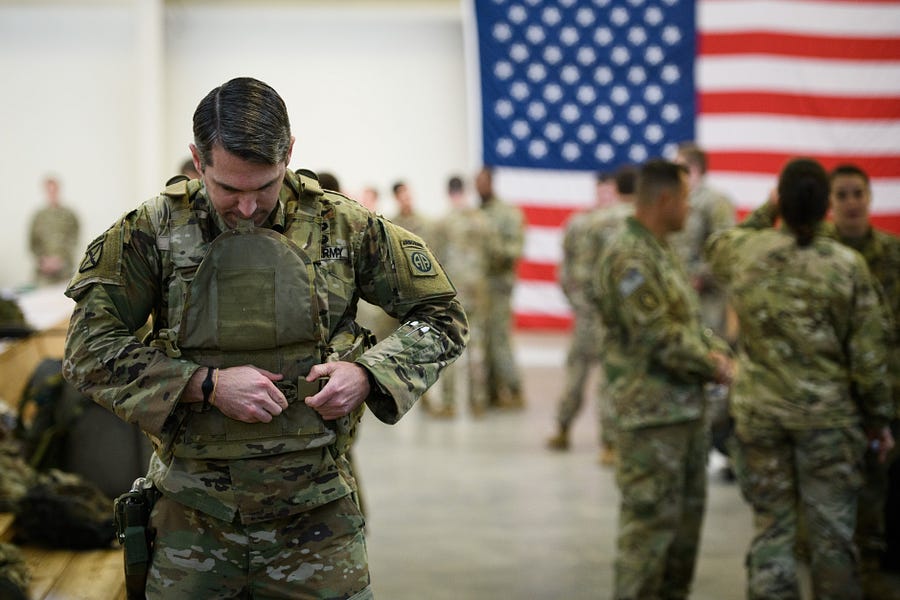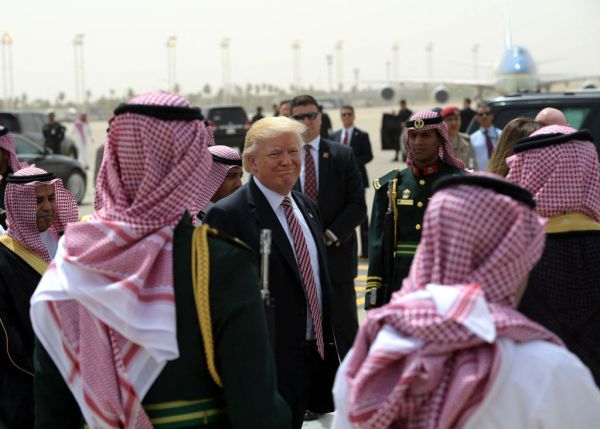Today’s goal is two-fold, to confuse and clarify. I’m hoping to muddy the waters on all the definitive projections and predictions about what’s going to happen next in Iran and Iraq. But first I hope to offer some clarity regarding the law of war. So, here goes—today’s French Press:
-
Yup, Trump threatened to commit war crimes.
-
Nope, we still don’t know if killing Qassem Suleimani was wise.
The law of war binds the president.
On Saturday afternoon, President Trump tweeted a clear threat to attack sites that were “important” to “the Iranian culture” if Iran struck Americans or American assets:
Then, on Sunday, he doubled down:
“They’re allowed to kill our people. They’re allowed to torture and maim our people. They’re allowed to use roadside bombs and blow up our people,” the president said. “And we’re not allowed to touch their cultural site? It doesn’t work that way.”
But it does, in fact, work that way. There are times when a legal analysis is complex. This is not one of those times. The War Crimes Act, 18 U.S.C. Section 2441, states that if any person commits a war crime as defined in the act, they can be fined, imprisoned for life—or, if death results—be executed. And what is a war crime? The definition is complicated, but here’s the simple part—a war crime is defined in part “as a grave breach in any of the international conventions signed at Geneva 12 August 1949.”
Article 53 of the Geneva Conventions (IV) of 1949 (which the United States both signed and ratified) prohibit the destruction of property owned by individuals, the state, or “social or cooperative organizations” unless “such destruction is rendered absolutely necessary by military operations.” Article 53 of Protocol I of the Geneva Conventions (which were signed but not ratified) prohibit any acts of hostility directed against the historic monuments, works of art or places of worship which constitute the cultural or spiritual heritage of peoples.”
Furthermore, the Geneva Conventions define a “grave breach” in part as the “extensive destruction and appropriation of property, not justified by military necessity and carried out unlawfully and wantonly.”
Moreover, the United States has ratified the 1954 Hague Convention on the Protection of Cultural Property in the Event of Armed Conflict. The Department of Defense Law of War Manual has an entire section dedicated to the protection of cultural property during hostilities and another section dedicated to special treatment of individuals who protect cultural property. Indeed the Law of War manual is layered with sections and provisions providing for the safeguard of cultural sites. Moreover, servicemembers who violate the Law of War are subject to prosecution under Article 18 of the Uniform Code of Military Justice.
In short, this is not a hard legal call.
There is a caveat to the protection of cultural sites (and it applies to the protection of civilian sites generally). The use of any site for military purposes — whether it be ancient temple, modern mosque, or a city hospital—converts it into a military target, and it is thus subject to proper and proportionate targeting. So if Iranian forces use cultural site as a firing position (perhaps to conceal a surface-to-air missile battery), the cultural site is fair game. But that’s obviously not what Trump is talking about.
It’s important to understand that while the president is the commander-in-chief, both he and the American military are subject to the rule of law. Presidential orders cannot override statutory law, and that’s precisely why the Secretary of Defense today declared that American forces would not strike cultural sites:
Defense Secretary Mark T. Esper sought to douse an international outcry on Monday by ruling out military attacks on cultural sites in Iran if the conflict with Tehran escalates further, despite President Trump’s threat to destroy some of the country’s treasured icons.
Mr. Esper acknowledged that striking cultural sites with no military value would be a war crime, putting him at odds with the president, who insisted such places would be legitimate targets. Mr. Trump’s threats generated condemnation at home and abroad while deeply discomfiting American military leaders who have made a career of upholding the laws of war.
It should go without saying, but an American president should not put an American secretary of defense in the position of publicly refuting the president’s announced military intentions. American presidents should not publicly announce the intent to commit war crimes.
One final note on this topic—yes I know that Iran and its allies routinely violate the laws of armed conflict, but that does not mean that Iran becomes a free-fire zone. It does mean that Iranian and Iranian-allied commanders can and should be tried by military tribunals for violating the laws of war, and it does mean—in certain, defined contexts—that the laws of war are relaxed to allow American troops to defend themselves. For example, we have fired on many mosques since 9/11 when enemy forces used them as firing points. During my own deployment, our troops were ambushed from a mosque—an act that touched off the most deadly and destructive firefight of our entire deployment. But did that mean we could level every mosque in our area of operations? No, no, no.
It’s still way too soon to decide whether the Suleimani strike was wise.
The theme of my newsletter last Thursday—written and posted mere hours before the Suleimani strike—can be summed up in five words. “The Middle East is complicated.” No, that’s insufficient. Let’s go with six words. “The Middle East is super complicated.” And one of the many complexities is that it’s very hard to tell whether public statements represent true sentiments or mere public posturing. Sometimes, threats and bluster truly indicate imminent hostilities. Many times, however, they represent face-saving posturing.
If you were to look only at the public statements of Iraqi and Iranian leaders, the Suleimani strike looks like the prelude to a disaster. But the closer you look, the less clear it becomes. Let’s break this down.
Did the strike cause the Iraqi Parliament to eject American troops from Iraq? If so, that would represent a massive strategic setback for the United States and a tremendous victory for Iran. They’d gladly trade Suleimani’s life for an American retreat.
Not so fast. The parliamentary vote was nonbinding, provided no timetable, and was boycotted by our Sunni and Shiite allies. In context, it looks much more like a statement of Shiite outrage than a governmental command. Americans shouldn’t believe our position in Iraq is secure, but neither should we believe that Iraq is demanding that we leave, at least not yet.
Did the strike cause America to halt its anti-ISIS mission? If so, this would constitute another American setback. The physical caliphate is in ruins, but thousands of ISIS fighters remain at large. If we were forced to halt the ISIS mission, we’d give the terrorist organization exactly the breathing space it needs.
Not so fast. Yes, the military has announced a “pause,” but that pause is “subject to continuous review.” Moreover, the underlying commitment to the mission remains. The military statement said that U.S. forces “remain ready to return our full attention and efforts back to our shared goal of ensuring the lasting defeat of Daesh.”
During my deployment there were times when we paused offensive operations to focus on force protection—a process some of my video-game playing colleagues called “turtling.” It’s a common-sense, necessary response to perceived new threats, and it becomes truly problematic only if it extends for weeks and months. ISIS can’t quickly snap back to the fighting force it once was, but it can recover ground if given an extended respite—so watch carefully (and I’ll watch with you). If we resume operations soon, than that’s strong evidence that American commanders don’t perceive a serious threat from local, Iranian-backed militias.
Did the strike unite a divided Iranian nation against America? If so, then the U.S. will have perversely harmed the cause of regime change even if it removed a terrible terrorist commander from the order of battle. And it’s quite possible that the strike has united Iranians. It’s very, very tough to get a true read on Iranian public opinion, especially in the absence of a free press. For example, the outside world remained ignorant for weeks of the true extent of deadly anti-regime protests late last year. We still may not have a complete picture. We see the images of Iranians mourning in vast numbers. Does that reflect the truth on the ground?
Not so fast. Writing in the Washington Post (kudos to the Post for publishing the piece) Iranian journalist Masih Alinejad says don’t believe everything you see:
But what to make of the crowds of flag-waving mourners streaming across TV screens? Without doubt, Soleimani had support among hard-liners and regime loyalists. The regime is not taking any chances, though. In the city of Ahvaz, where large numbers of people turned out to mourn Soleimani, the government has forced students and officials to attend. It provided free transport and ordered shops to shut down. According to videos sent to me by people inside the country, the authorities are making little kids write essays praising the fallen commander. First-graders who didn’t know how to write were encouraged to cry for Soleimani.
More:
Remember all the articles that predicted how Iranians were going to unite in resistance to President Trump’s sanctions? The same analysts who missed November’s protests are now predicting Iranians will rally around the flag.
This sorely underestimates the anger and resentment over the crackdown. The authorities forced many families to pay blood money in order to receive the body of their loved ones from the morgue. Some even had to sign official forms waiving the right to hold a public funeral as a condition of getting bodies returned.
Perhaps the Iranian public is rallying around the flag. Perhaps not. But Alinejad’s Post piece is an excellent reminder that orchestrated public displays by authoritarian regimes do not always reflect true popular sentiment.
Didn’t the strike cause Iran to finally tear up the nuclear deal? If so—and combined with the developments above—America could well face a near future where it’s forced to withdraw from Iraq while Iran races to build a bomb. We’d face a terrible choice—initiate a true shooting war or learn to live with an Iranian bomb. And yes, Iran did announce that it “will have no limitations in production, including enrichment capacity.” This does seem to shred what remained of the nuclear deal.
Not so fast. There’s a reason why said “seem.” There’s a reason why the New York Times said in its story that the announcement “seemed to signal the de facto collapse of the 2015 agreement” and said Iran was “all but abandoning” the agreement.
I freely admit that I’m unschooled in nuclear physics and nuclear engineering, but I know this much—bombs aren’t built by public statements. To build a bomb, Iran has to build and activate an infrastructure. We’ll know if and when Iran truly abandons its obligations under the nuclear deal (and if and when Iran truly tries to race to build a bomb) when we see Iranian actions, not when we read Iranian words.
In tense times—and in response to bold gambles—we desperately want answers, fast. Are we going to war? Did we make a mistake? But we don’t have those answers. It’s true that much of the Trump administration’s conduct doesn’t give the American people any reassurance that a steady hand is at the helm of the ship of state.
Over on our Dispatch homepage, Steve Hayes has penned an outstanding (and disturbing) account of how the military accidentally transmitted a letter to the Iraqi government indicating an intention to withdraw from Iraq. That’s an absurd mistake at a delicate time. And Trump’s own statements—regarding war crimes and regarding his disregard for Congress—are singularly intemperate and disconcerting. When America is on the edge of a serious conflict, this is when the president needs to remember that he should try to rally all Americans. He’s not simply the president of his base.
To a disturbing degree, these missteps remind us that we’re relying a great deal on Iranian weakness (rather than American competence) to prevent wider war and greater setbacks. Iran’s economy is a wreck. As noted above, it’s just emerged from a period of deadly internal protests. While its missile force is one of the most formidable in the region, much Iranian military equipment is aging. Even if it could hurt America (and, make no mistake, it could), it knows the inevitable ultimate outcome of a true force-on-force conflict. There’s good reason to believe that neither party wants to fight a shooting war— thus there is likely a limit to the extent Iran will immediately escalate the conflict, either through direct attacks or terror strikes through proxies. Iraq may bide its time before responding. And while America is bringing new troops to the region, they’re arriving in numbers designed to deter, not invade. There is no indication that we’re engaged in the kind of troop, plane, and ship buildup necessary to fully engage Iran.
None of this means that we should breathe a sigh of relief. Unwilling parties have stumbled into war before, Iraqi militias may launch their own attacks, and things could go south quite quickly, but for now we wait. The Trump administration punched Iran in the face, and while American forces are on guard, it appears no second big punch is imminent. It still remains to be seen how—and when—Iran punches back.
One last thing …
Ladies and gentlemen, I present to you—once again—Memphis Grizzly Ja Morant:
Photograph of U.S. troops from the Army’s 82nd Airborne Division waiting at Fort Bragg for deployment to the Middle East by Andrew Craft/Getty Images.







Please note that we at The Dispatch hold ourselves, our work, and our commenters to a higher standard than other places on the internet. We welcome comments that foster genuine debate or discussion—including comments critical of us or our work—but responses that include ad hominem attacks on fellow Dispatch members or are intended to stoke fear and anger may be moderated.
With your membership, you only have the ability to comment on The Morning Dispatch articles. Consider upgrading to join the conversation everywhere.